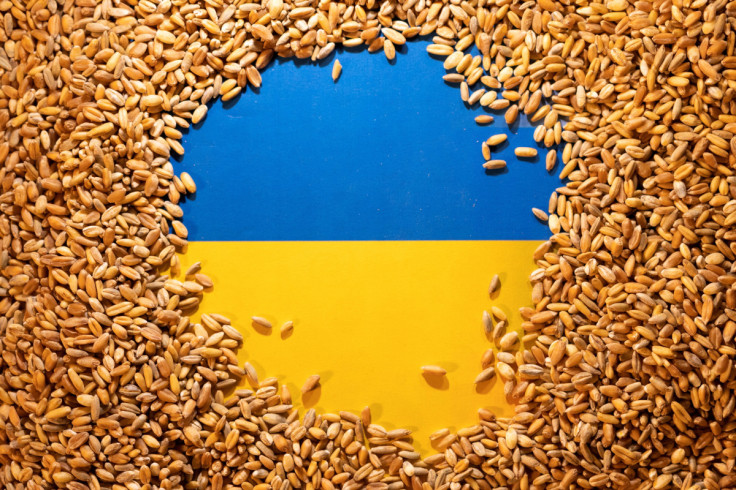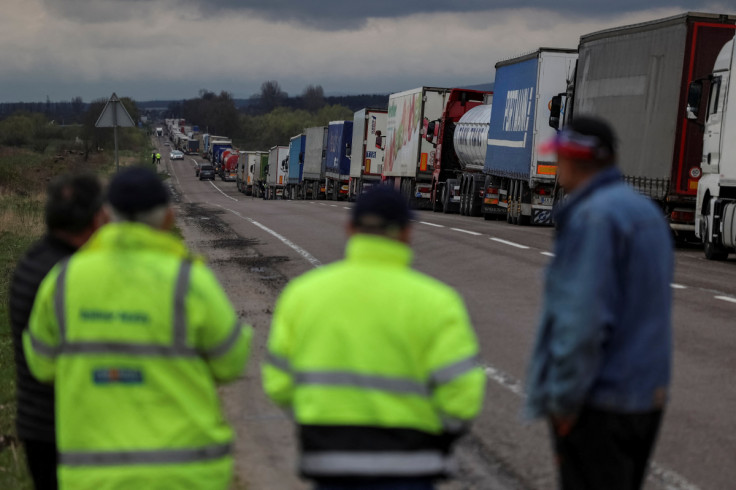Ukraine Grain Import Bans Mount As Kyiv Seeks Transit Deal

Slovakia on Monday joined Poland and Hungary in banning grain imports from Ukraine as even Kyiv's staunchest allies come under domestic pressure to shield their agriculture markets.
The heat is mounting on Brussels to work out a European Union wide solution after Warsaw and Budapest announced bans on some imports from Ukraine at the weekend, with other countries in eastern Europe saying they are also considering action.
Farmers say imports from Ukraine have lowered prices and reduced their sales. In Poland, the issue has created a problem in an election year for the ruling nationalist Law and Justice (PiS) party that relies on rural areas for much of its support.
"Ukraine needs help, but the costs of this help should be spread over all European countries, not just the frontline countries, especially Poland. We do not agree to this, because it harms our farmers," Polish agriculture minister Robert Telus said after talks that began in Warsaw on Monday.
Kyiv said it aims to re-open food and grain transit via Poland as "a first step" to ending import bans, but Telus said that no solution had so far been found to guarantee that the grain in transit would not end up on the local market.
Some Black Sea ports were blocked after Russia's invasion of Ukraine began last year and logistical bottlenecks trapped large quantities of Ukrainian grain, which is cheaper than that produced in the EU, in Central European countries.
The Polish, Hungarian and Slovakian export and transit bans come as a deal to allow the export of millions of tonnes of Ukrainian grain via the Black Sea, despite the Ukraine war, nears its May 18 expiry. Meanwhile, Russian demands have left the prospect of an extension of this deal uncertain.
The combined impact of the bans and failure to agree an extension would strand millions of tonnes of grain inside Ukraine, a major agricultural producer that makes a substantial part of its gross domestic product from food sales.
"The first step ... should be the opening of transit, because it is quite important and it is the thing that should be done unconditionally and after that we will talk about other things," Ukrainian Agriculture Minister Mykola Solsky said before the talks in Warsaw.
To prevent any grain entering its market, Poland's ban also covered transit through the country, which imported 2.45 million tonnes of grain, or three quarters of total imports, from Ukraine in 2022, Polish Agriculture Ministry data showed.
The bans have left truck drivers stranded for several days in long traffic jams on the border baffled.
"We can't go in either direction. Yes, the Poles reached out to us, I'm very thankful to them. I'm immensely grateful, the whole of Ukraine is, the whole world even. But now, Poland doesn't let (us) in for some reason," Mykola Bervin, a driver from Zhytomyr in Ukraine, told Reuters.
Bervin said he had been stuck for three days and the tailback was more than 25 kilometres long.
EU ACTION 'INEVITABLE'
Slovakia approved halting imports indefinitely following Poland's move, although it maintained transit, while the BTA news agency reported that Bulgaria's agriculture minister also said the country could limit imports.
Istvan Nagy, Hungary's farm minister, said a solution was needed beyond the national level, calling eventual EU measures inevitable. The Czech Republic also urged an EU-wide solution while saying it would not introduce a ban itself for now.
Bulgaria, Hungary, Poland, Romania and Slovakia raised the issue with the European Commission last month, saying tariffs on Ukrainian imports should be considered, while states have also pushed for an EU purchase mechanism to buy up cheap grain.
Telus said that six countries would like to meet with the EU commissioner responsible for trade to find a solution.
A senior EU official said EU envoys would discuss Poland and Hungary's bans on Wednesday - after the bloc's executive said on Sunday that unilateral action was unacceptable.
The official said low global prices and demand meant grain was staying in the bloc rather than being sold on.

© Copyright Thomson Reuters 2025. All rights reserved.





















